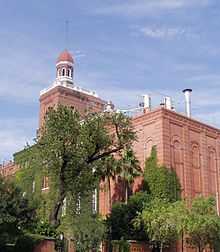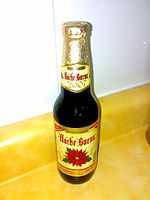Cuauhtémoc Moctezuma Brewery
 | |
| Industry | Beverage |
|---|---|
| Founded | 1890 |
| Headquarters | Monterrey, Mexico |
| Products | Beers |
| Owner(s) | Heineken International |
Cervecería Cuauhtémoc-Moctezuma (Cervecería Cuauhtémoc-Moctezuma Heineken de México) (English: Cuauhtémoc-Moctezuma Brewery) is a major brewery based in Monterrey, Nuevo León, Mexico, founded in 1890. Currently it is a subsidiary of Heineken International.
The company operates brewing plants in Monterrey, Tecate, Navojoa, Guadalajara, Toluca, Orizaba and, beginning in 2012, Chihuahua, producing the Dos Equis, Sol, Bohemia, Superior, Carta Blanca, Noche Buena, Indio, Casta and Tecate brands among others. It has an annual production of 3.09 GL (gigalitres).
History
The Cuauhtémoc brewery was founded in Monterrey in 1890 by José Calderón Muguerza, José A. Muguerza, Francisco G. Sada Muguerza, Alberto Sada Muguerza, Isaac Garza Garza (brother in-law of Francisco and Alberto, married to their sister Consuelo Sada Muguerza), Joseph M. Schnaider, and Wilhelm Hasse, with capital of 150,000 pesos, starting with the Carta Blanca brand. Cuauhtémoc brewery produced its first beer barrel in 1893 and won first prize in the Chicago and Paris world fairs.
In 1909 Cerveceria Cuauhtemoc started to expand vertically. To provide glass bottles, in 1909, Vidrios y Cristales de Monterrey S.A., later Vidriera Monterrey, S.A. later Grupo Vitro, was founded. In order to produce boxes, bottle caps, and packaging materials, Fabricas de Carton Monterrey was founded[citation needed] in 1900. In 1929, Malta, S.A. was established to produce malt for the brewery. The cardboard box department would eventually become Titán Company.
During the Mexican Revolution which began in 1910, its original founders supported Victoriano Huerta. As a consequence, his rival Venustiano Carranza seized the brewery, so the founders' families fled to Texas. They re-acquired the brewery through the intervention of U.S. and Russian diplomats.
The Sociedad Cuauhtemoc was founded in 1918 to provide medical and educative services to the workers' families; the final objective was to provide a welfare system to avoid strikes. The working day was reduced from twelve to nine hours in 1907.
By 1936 the holdings of the Garza, Calderon and Sada families and their associates were divided into two groups: the Cuauhtemoc (brewery) group and the Vidriera (glass) group. In that year the family's holdings were reorganized, creating Valores Industriales S.A. (VISA) as a holding company controlling the majority of shares of the firms formerly held by Cuauhtemoc, especially Cerveceria Cuauhtemoc and Famosa.
During the 20th century, Cerveceria Cuauhtemoc Moctezuma was headed by Jose Calderon Muguerza and the two Garza Sada brothers Eugenio Garza Sada (assassinated in 1973 in a kidnapping attempt by Mexican left-wing guerrillas) and Roberto Garza Sada. In 1943, company executive Eugenio Garza Sada with his brother and other prominent people founded the Monterrey Institute of Technology and Higher Education (ITESM), and in 1973, the Mexican Professional Baseball Hall of Fame was opened at the site of the company headquarters.
After Eugenio Garza Sada's assassination, VISA, the Cerveceria Cuauthtemoc Moctezuma's holding, was split into two units: Visa and Grupo Industrial Alfa. Alfa received Hylsa and cash, while Visa retained the brewery business and its stake in the Banco de Londres and its affiliated institutions, and Eugenio Garza Lagüera, a son of Eugenio Garza Sada, was named CEO of Cerveceria Cuauhtemoc Moctezuma, and Bernardo Garza Sada a son of Roberto Garza Sada was named CEO of Alfa.
When oil prices fell in 1981, Mexico's economic boom, financed with borrowed money, abruptly halted. Visa found itself more than $1 billion in debt the following year, and the federal government nationalized Banca Serfin—the nation's third-largest bank—in which Visa held a 77 percent stake. The nondeposit banks and associated financial companies in Grupo Financiero Serfin, not nationalized, were reorganized into a new financial-services group called Valores de Monterrey (Vamsa). Vamsa's life-insurance subsidiary, Seguros Monterrey, was the largest in Mexico.
Adding to Visa's problems was dissatisfaction within the extended family. Javier Garza Sepulveda, who owned 47 percent of the holding company, tried unsuccessfully to wrest Visa from Eugenio,and Gabriel widow, who only had part of the rest, after all their brothers, sister Alicia, and some other cousins sold all their stock to Javier Garza. He filed several suits charging Eugenio with fraud, mishandling the administration of the conglomerate but was ultimately unsuccessful in winning control due to the Mexican corrupt judicial system. In 1991 Garza Calderon's father, Javier Garza Sepulveda, tried to gain control of Visa through his Grupo Gentor .
With the integration of the Moctezuma brewery in 1985, the brands XX, Superior, Sol, and Noche Buena were added to the brands Carta Blanca, Tecate, Bohemia and Indio.
In 1988 Fomento Económico Mexicano, S.A. de C.V. was formed as the main subsidiary of Visa containing the beer and other companies. In 1994 FEMSA sold a 22 percent share of its beer business to John Labatt Ltd. of Canada and signed an agreement with Labatt to associate their respective companies in the United States. FEMSA became the successor of Visa in 1998. On 11 January 2010, the Dutch brewing company Heineken International announced it would acquire the beer activities of FEMSA, including Cuauhtémoc Moctezuma Brewery.[1]
Breweries

The company operates plants in Monterrey, Tecate, Navojoa, Guadalajara, Toluca, Orizaba and for 2012 one in Chihuahua.
The company has an annual production of 3.09 GL (816,300,000 U.S. gal; 679,700,000 imp gal) (see also U.S. gallons)
The Cuauhtémoc Moctezuma Brewery can be visited. Hours are Monday through Friday from 9:00 to 17:00 and Saturday from 9:00 to 14:00. Tours are available free of charge and are offered in both English and Spanish.
The Brewery has a beer garden which offers a free glass of Bohemia, Dos Equis, or Carta Blanca. The Garden features old brewery machines and a century-old beer truck. The garden's hours are every day from 10:00 to 18:00 hrs.
Beers
The company produces a range of pale and dark lagers, some of which are available only in Mexico.
Carta Blanca
The brewery's original premium beer. Carta Blanca takes its name from the French "carte blanche".
Sol
Introduced in the 1890s, originally called El Sol. Sol is for sale in four sizes in Mexico: 500 ml (16.91 U.S. fl oz; 17.60 imp fl oz) (see also U.S. fluid ounce) 355 ml (12.00 U.S. fl oz; 12.49 imp fl oz)-not refundable, aluminium can, 325 ml (10.99 U.S. fl oz; 11.44 imp fl oz) bottles and 940 ml (31.79 U.S. fl oz; 33.08 imp fl oz), this last is known as Caguama. New variations from Cerveza Sol include: Sol Brava (a dark beer in a light dark bottle), Sol Light, Sol Sal y Limón (Sol with lime and salt) Sol Clamato (Beer mixed with Clamato) and Sol Cero (non-alcohol beer).
Indio
Indio beer has six sizes:[2] Aluminium can 325 ml (10.99 U.S. fl oz; 11.44 imp fl oz), 355 ml (12.00 U.S. fl oz; 12.49 imp fl oz)-not refundable and 325 ml (10.99 U.S. fl oz; 11.44 imp fl oz) bottles plus a refundable and not-refundable .5 litre bottle, a refundable 1.00 litre bottle and a 1.25 litre refundable bottle b[3] or.[4]
Bohemia
Bohemia takes its name from the Czech region. It is pale pilsner, although recently a new dark Vienna beer has been launched as Bohemia Obscura (See Image Gallery below). In addition, Cuauhtémoc Moctezuma has added a craft-style wheat beer to the line - "Bohemia Weizein" a German Kristallweizen was released in summer 2011.[5]
Dos Equis
Dos Equis is a lager that was originally brewed by the German-born Mexican brewer Wilhelm Hasse in 1897. The brand was named Siglo XX ("20th century") to commemorate the arrival of the new century, and the bottles were marked with the Roman numeral for 20 ("XX"), thus "Dos Equis" which is Spanish for "two X's".
The main brand Dos Equis XX Special Lager is a 4.45% abv pale lager sold in green bottles.[6] Dos Equis XX Amber is a 4.7% Vienna-style amber lager sold in brown bottles,[7] and was first exported to the United States in 1973.[8]
Tecate
Tecate and Tecate Light are popular pale lagers named after the city of Tecate, Baja California, where they were first produced in 1943. Originally brewed by a local company, Tecate was acquired by Cuauhtémoc Moctezuma in 1955. Tecate is sold in both distinctive red aluminium cans and in twist-top bottles. Tecate Light was launched in 1992 by Héctor Emilio Ayala, who was the project manager.
In 2013 Tecate Titanium is launched as a new product of the company.
Other beers
- Moctezuma
- Noche Buena Its name (literally "Good Night") means "Christmas Eve" in Spanish. It is a seasonal beer that is only sold toward the end of the year.
- Sito de Kaiser
- Casta
- Superior Once the front beer of Cervecería Moctezuma. Its marketing slogan was "La Rubia que todos quieren" ("The most wanted blonde") referring to its pure yellow tone.
Advertising
Dos Equis
In 2007, Dos Equis inaugurated its "The Most Interesting Man in the World" advertising campaign.
The advertisements feature a semi-bearded, debonair gentleman roughly in his 70s (portrayed by actor Jonathan Goldsmith)[9] with Frontline narrator Will Lyman conducting voiceovers. As Ottmar Liebert's "Barcelona Nights" plays in the background, the advertisements featured a montage of daring exploits involving "the most interesting man" when he was younger. The precise settings are never revealed, but he performs feats such as: freeing an angry bear from a painful-looking bear trap; shooting a pool trick shot before an Indian audience; catching a marlin while cavorting in a Hemingway-esque scene with a young woman; winning an arm-wrestling match in a South American setting; surfing the killer wave; and bench pressing two East Asian young women in a casino setting, each woman being seated in a chair.
The end of the advertisement says, "I don't always drink beer, but when I do, I prefer Dos Equis." Each commercial ends with the sign-off: "Stay thirsty, my friends."[8][10]
Tecate
Tecate beer has begun advertising heavily in the United States; initially in the Spanish-language media and more recently in the English-language media. Their tag lines are "Con Carácter" ("With Character") and "It's not beer, it's cerveza".[11][12] In 2009, Tecate Light launched a television ad campaign targeted at the Mexican-American community, which features boxer Oscar de La Hoya and wrestler Rey Mysterio, Jr.[13] Also in 2009, Tecate announced a sponsorship agreement with ESPN sports.[14]
In the 2007 movie Hellboy II: The Golden Army, Hellboy is shown drinking Tecate Light with Abraham Sapien and in a locker room with Krauss.
Football teams sponsored
First Division
|
|
Liga de Ascenso
|
|
Image gallery
-

Noche Buena beer, showing the Noche Buena (Poinsettia) and a volume of 355 ml (12.0 U.S. fl oz; 12.5 imp fl oz) on the label.
-

Dos Equis (XX)
-

Bohemia beer
-

Michelada and Cerveza Indio
References
- ↑ "Heineken agrees Mexican beer deal". BBC News. 11 January 2010. Retrieved 30 April 2010.
- ↑ Indio's official website
- ↑ Brands
- ↑ Brands (English)
- ↑ "Bohemia Weizen". Ratebeer. Retrieved 17 December 2012.
- ↑ Dos Equis XX Special Lager from FEMSA, a Pale Lager style beer: An unofficial page for Dos Equis XX Special Lager from FEMSA in Monterrey/Veracruz-Llave, , Mexico
- ↑ Dos Equis XX Amber from FEMSA, a American Dark Lager style beer: An unofficial page for Dos Equis XX Amber from FEMSA in Monterrey/Veracruz-Llave, , Mexico
- ↑ 8.0 8.1 Dos Equis website for the U.S. market
- ↑ blog
- ↑ Stay Thirsty, My Friends
- ↑ "Beer company launches first bilingual multimedia ad campaign". Retrieved 12 September 2012.
- ↑ ESPN 1000 and Tecate Light
- ↑ http://www.mediapost.com/publications/?fa=Articles.showArticle&art_aid=105736
- ↑ http://www.saddoboxing.com/boxing_news/19981-espn-and-tecate-announce-ground-breaking-multimedia-boxing-sponsorship-agreement-philboxing.html
External links
- Cervecería Cuauhtémoc Moctezuma
- Sol beer
- Michael Jackson's Beer Hunter
- RateBeer
- Dos Equis
- Stay Thirsty, My Friends
- The Most Interesting Academy
- Tecate
- Cerveza Sol